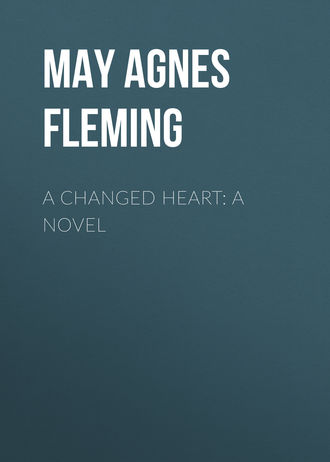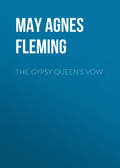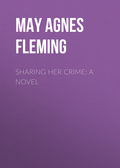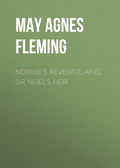
May Agnes Fleming
A Changed Heart: A Novel
Olive dined at Mr. Blair's that day, and heard them discussing the sermon, and the unexpected appearance of Mr. Wyndham and his mother. Olive said very little – the panic in her soul had not ceased. The shortness of time, the length of eternity – that terrible eternity! – had never been brought so vividly before her before. Was the express-train in which she was flying through life near the end – near that awful chasm where all was blackness and horror? Human things frittered away – earthly troubles, gigantic before, looked puny and insignificant seen in the light of eternity – so soon to begin, never to end! She had been awakened – she never could sleep again the blind, heathenish sleep that had been hers all her life, or woe to her if she could.
Mr. Blake and Miss Blair walked home with her in the hazy September moonlight. They found Mr. Wyndham sitting in one of the basket-chairs in the glass porch, looking up at the moon as seen through the smoke of his cigar, and Olive's inconsistent heart throbbed as if it would break from its prison and fly to him. Oh, if all this miserable acting could end; if he would only love her, and let her love him, she would yield forever the wealth that had never brought her happiness, and be his true and loving wife from henceforth, and try and atone for the sins of the past. She might be a good woman yet, if her life could only be simple and true like other women, and all this miserable secresy at an end. But, though the silken skirt of her rich robe touched him, they could not have been further apart if the wide world divided them. She could have laid her head down on the table there, and wept passionate, scalding tears, so utterly forlorn and wretched and lonely and unloved did she feel. She could not talk – something rose in her throat and choked her – but she listened to Mr. Wyndham telling in his quiet voice how he had persuaded his mother to go out that day to hear the famous preacher, and how he thought it had done her good.
Val and Laura did not stay long, but set out on their moonlit homeward way. Ann Nettleby sat in her own doorway, and Val paused to speak to her.
"No news of Cherrie, yet, Ann?"
Ann made the usual reply, "No," and they walked on, talking of lost Cherrie.
"I'll find her out yet," Mr. Blake said, determinedly. "I don't despair, even though – well, what's the matter?"
Laura had uttered an exclamation, and clung suddenly to his arm. Redmon road was lonely, as you know, and not a creature was to be seen; but Laura was pointing to where, under the trees, in the moonlight, a woman was standing still. A woman or a spirit, which? For it was robed in white from head to foot, and a shower of pale hair drifted over its shoulders. The face turned toward them as they approached, a face as white as the dress, and Laura Blair uttered a loud shriek as she saw it, reeled and would have fallen, had not Val caught her in his arms.
Val had turned white himself, for the pale shadow under the trees had worn the dead face of Nathalie Marsh! As Laura shrieked it had vanished, in a ghostly manner enough, among the trees, and Val Blake was left standing gaping in the middle of Redmon road, holding a fainting lady in his arms.
CHAPTER XXXI.
VAL'S DISCOVERY
Mr. Blake was in a predicament. Some men there are who would by no means turn aghast at being obliged to hold a fair, fainting damsel in their arms, but Mr. Blake was none of these. Should he lay her down on the road while he went for help, or should he carry her to the Nettleby Cottage? Yes, that was the idea; and Mr. Blake lifted the fair fainted in his stalwart arms, and bore her off like a man. The cottage was very near, and Mr. Blake was big and strong; but for all that he was in a very red and panting state when he gave a thundering knock at the cottage-door. One hundred and twenty pounds of female loveliness is no joke to carry, even for a short distance; and he leaned Miss Blair up against the door-post in such a way that she nearly toppled over on Miss Ann Nettleby's head, when that young lady opened the door. Ann screamed at the sight, but Mr. Blake pushed past her with very little ceremony.
"She's only fainted, Ann! Don't make a howling. Get some water, or hartshorn, or something, and bring her to."
Miss Ann Nettleby was a young lady of considerable presence of mind, and immediately began to apply restoratives. Whether it was that nature was coming round of her own accord, or from the intrinsic merit of burnt feathers held under her nose, and cold water doused in her face, Miss Blair, with a long, shivering sigh, consented at last to come to, and looked around her with a blank, bewildered stare.
"Well, Laura," said Val, stooping over her, "how do you find yourself, now?"
At the sound of his voice, recollection seemed to flash vividly across Laura's mind. She was lying on the couch in the front room; but she started up with a scream, her eyes dilating, and, to Mr. Blake's dismay, flung herself into his arms.
"Oh, Val!" she cried, clinging wildly to him, "the ghost! the ghost! I saw the ghost of Nathalie Marsh."
Ann Nettleby's eyes grew as round as saucers.
"The ghost of Nathalie Marsh!" she repeated. "Lor! Miss Laura, you haven't seen her ghost, have you?"
"Come, Laura, don't be frightened," said Val, soothingly, though sorely perplexed himself. "There is no ghost here, at all events. Perhaps you had better go back to Redmon, and stay with Mrs. Wyndham all night."
But Laura, gasping and hysterical, protested she would not venture out that night again for all the world, and ended the declaration by falling back on the lounge in a violent fit of hysterics. Val seized his hat and made for the door.
"You look after her, Ann," he said, "and I'll run up to Redmon for Mrs. Wyndham. She'll die before morning if she keeps on like this."
Mr. Blake's long limbs never measured off the ground so rapidly before, as they did now the distance between the cottage and the villa. In the whole course of his life, Val Blake had never received such a staggerer as he had this night. He did not believe in ghosts; he was as devoid of imagination as a pig; he had not eaten a heavy supper, nor drank one single glass of wine, yet he had seen the ghost of Nathalie Marsh! They had not been talking of the dead girl; they had not been thinking of her; yet she had stood before them, wearing the face, and looking at them out of the blue eyes they knew so well. It was all very fine to talk of the freaks of the sense of vision, of optical illusions, and all that sort of thing. It was no illusion, optical or otherwise. Nathalie Marsh was dead and buried, and they had seen her ghost on Redmon Road.
The servant who answered Mr. Blake's ring looked rather surprised, but showed him into the library, and went in search of his mistress. Olive came in, wearing the dress in which they had left her, and Val told his story with blunt straightforwardness. Olive's black eyes opened to their widest extent.
"Seen a ghost! My dear Mr. Blake, do I understand you aright?"
Mr. Blake gave one of his nods.
"Yes. It was a ghost, and it frightened Laura into a fit; and she's in one still, down there at Nettleby's. It was a ghost, I'll take my oath of it; for it had Nathalie Marsh's face, and Nathalie Marsh is dead and buried."
There was a slight noise at the door. Olive Wyndham's quick ear recognized it, and she turned round. Mr. Blake followed her eyes, and saw Paul Wyndham standing in the doorway. But what ailed him? His face was always pale; but it looked ghastly at this moment, turning from its natural hue to an awful ashen white.
"Hallo, Wyndham!" cried Val, "what's gone wrong with you? You look as if you had seen a ghost yourself."
"There is nothing the matter with me," said Mr. Wyndham, coming quietly forward. "What is that about ghosts, and where have you left Miss Blair?"
"At Nettleby's, fit to die of fright. We saw a woman who has been dead for more than a year, on the road; and Laura screamed out, and dropped down like a stone!"
"My dear Blake!"
"I wanted her to come up here," pursued Val, "and stay all night, but she went off into strong hysterics in the middle of what I was saying; so I left her with Ann Nettleby, and came up here for Mrs. Wyndham."
"I will go to her at once," Olive said, ringing the bell; "but, Mr. Blake, I don't understand this at all. Seen a ghost! It is incomprehensible!"
"Just so!" said Mr. Blake, with constitutional composure, "but it's true, for all that. Nathalie Marsh is dead, and buried over there in the cemetery; but, for all that, I saw her as plainly this night on Redmon road as ever I saw her in my life!"
There was something in Mr. Blake's manner that carried conviction with it, and Mr. Blake was not the man to tell a cock-and-bull story, or let himself be easily deceived. Had Laura Blair, a fanciful and romantic girl, alone told the story, every one would have laughed incredulously, but Val Blake was another story. Matter-of-fact Val had no fancies, natural or supernatural, and told his story with a resolute air of conviction now that perplexed his hearers. Mr. Wyndham affected to laugh; but, somehow, the laugh was mirthless, and his face and lips remained strangely colorless.
"It was some one playing a practical joke, depend upon it," he said; "perhaps that imp of mischief, Sam's brother. As to ghosts – why, Blake, where have your wits gone to?"
"All right," said Val; "I don't ask you to believe it, you know; but if it wasn't Nathalie Marsh's spirit, then it was Nathalie Marsh in the flesh, and we have all been deceived, and the woman buried in Speckport cemetery is not the woman I took her to be."
Paul Wyndham turned round suddenly, and walked to the window and looked out. He turned round so suddenly that neither his wife nor his friend saw the awful change that came over his face when these words were said. A servant brought Mrs. Wyndham her hat and shawl, and he did not turn round again until they were leaving the room. Olive's heart stood still at sight of the white change in his face.
"You are ill, Mr. Wyndham," she said, looking at him sharply and wistfully.
"You're as pale as a ghost," said Mr. Blake; "don't come with us – what's the matter?"
Mr. Wyndham gave them his former answer, "Nothing," and watched them walking down the moonlit avenue together, until they were out of sight. Then he left the room, put on his hat and overcoat, locked his own door, and dropped the key in his pocket, and followed them. Half an hour later, while Olive and Val were persuading Laura to come with them to Redmon, he was knocking at the door of Rosebush Cottage, and being admitted by Midge, whose ruddy face wore a look of blanched consternation at sight of him.
Mr. Val Blake walked home in the moonlight alone. As he passed the spot where, under the tree, the ghostly-white figure with the hazy hair and deathlike face had stood, he felt a cold thrill in spite of himself; but the spot was vacant now – not a soul, in the flesh or out of it, was to be seen on Redmon road. Mr. Blake, as I said, walked home in the moonlight alone, and astounded the whole Blair family by the unearthly tidings. For good Mrs. Blake's sake he omitted that part concerning Laura's fainting-fits – merely saying she was frightened, and he had thought it best to leave her at Redmon. Mrs. Blair turned pale, Master Bill grinned, and Mr. Blair pooh-poohed the story incredulously.
"A ghost! What nonsense, Blake! I always thought you a sensible man before; but if you draw the long bow like that, I shall have to change my opinion."
"Very well," said Val, in nowise disturbed at having his veracity doubted, "seeing's believing! You may think what you please, and so shall I!"
Before it took its breakfast next morning, Speckport had heard the story – the astounding story – that the ghost of Nathalie Marsh had appeared to Mr. Blake and Miss Blair on Redmon road, and had frightened the young lady nearly to death. Speckport relished the story amazingly – it was nothing more than they had expected. How could that poor suicide be supposed to rest easy in her grave! Mrs. Marsh, over her eternal novels, heard it, and cried a little, and wondered how Mr. Blake could say such cruel things on purpose to worry her. Captain Cavendish heard it, and laughed incredulously in Mr. Blake's face.
"Why, Val," he cried, "are you going loony, or getting German, or taken to eating cold pork before going to bed? Cold pork might account for it, but nothing else could ever excuse you for telling such a raw-head-and-bloody-bones story as that, and expecting sensible people to believe it. As to Laura, any gatepost or white birch tree in the moonlight would pass for a ghost with her."
Mr. Blake was entirely too much of a philosopher to waste his time in controversy with these unbelievers. He knew well enough it was no gatepost or white birch he had seen, but the subject was full of mystery and perplexity, and he was glad to let it drop. It could not be Nathalie Marsh; he had seen her dead and buried; and ghosts were opposed to reason and common sense, and all the beliefs of his life. It was better to let the subject drop then; so he only whistled when people laughed at him, or cross-questioned him, and told them if they didn't believe him the less they said about it the better.
But the strange story was not so soon to die out. Mr. Blake, about a fortnight after, was suddenly and unexpectedly confirmed. The ghost of Nathalie Marsh had been seen again – this time in Speckport Cemetery, kneeling beside her own grave; and the person who saw it had fled away, shrieking and falling in a fit at the sexton's door. It was the sexton's nephew, a lad of fifteen or thereabouts, who, going at nightfall to close the cemetery-gates, had seen some one kneeling on one of the graves. This being nothing unusual, the boy had gone over, to desire the person to leave, when, to his horror, it slowly turned round its face – the face of one buried there a twelvemonth before. With an unearthly yell, the boy turned tail and fled, and had been raving delirious ever since. The alarmed sexton had gone out to prove the truth of the incoherent story, but had found the cemetery deserted, and no earthly or unearthly visitant near the grave of the doomed girl.
Here was a staggerer for Speckport! People began to look blankly at each other, and took a sudden aversion to being out after nightfall. The "Snorter" and the "Bellower" and the "Puffer" reluctantly recorded this new marvel, confirming, as it did, the truth of Mr. Blake's story; but opined some evil person was playing off a practical joke, and hinted to the police to be on the look-out, and pin the ghost the first opportunity. It was the talk of the whole town – the boy was dangerously ill, and young ladies grew nervous and hysterical, and would not stay a moment in the dark, for untold gold. Laura Blair was worst of all; she was hysterical to the last degree, and shrieked if a door shut loudly, and fell into hysterics if they left her alone an instant night or day. Olive Wyndham's dark face paled with terror as she listened. Was the dead and defrauded heiress rising from her grave because her earthly wrongs would not let her rest there? Would she appear to her next?
Was it superstitious fear that had taken all the color – and he never at best had much to spare – out of Paul Wyndham's face, and left him the ghost of his former self. The servants at Redmon could have told you how little he ate, and perhaps that accounted for his growing as thin as a shadow. A dark look of settled gloom over-shadowed his pale face always now. He spent more of his time than ever at his mother's cottage, and when asked what was the matter – was he ill? – he answered no, but his mother was. Why, then, did he not have medical advice, sympathizers asked; and Mr. Wyndham replied that his mother declined – she was very peculiar, and positively refused. What did he suppose was the matter with her? and Mr. Wyndham had told them it was her nervous system – she was hypochondriacal – in fact; and he made the admission very reluctantly, and with a painful quivering about the mouth – she was not quite herself – her mind had lost its balance. And the sympathizers going their way, informed other sympathizers that all old Mrs. Wyndham's oddities were accounted for – the woman was mad!
Speckport pitied poor Mr. Wyndham, saddled with an insane mother, very much, when they saw his pale, worn face, and that gloomy look that never left it. Olive pitied him, too; and would have given the world, had it been hers to give, to comfort him in his great trouble; but she was nothing to him, and her heart turned to gall and bitterness, as she thought of it. No, she was nothing to him, she scarcely ever saw him at all now, and he seemed unconscious of her presence when they were together. But it was a relief to know the secret of Rosebush Cottage – however dreadful that secret was, it were better than the first diabolical thought suggested by Catty Clowrie. Once Olive Wyndham, in the humility born of this new love, had descended from the heights of high and mightydom on which she dwelt, and ate humble pie at her cold lord's feet. She might have left the unsavory dish alone – her humility was no more to him than her pride, and she had been repulsed. Not rudely, or unkindly. Mr. Wyndham was a gentleman, every inch of him, and would not be harsh to a woman; but still she was repulsed, and her proud heart quivered to its inmost core with the degradation.
She had found him, one evening on entering the library, sitting alone there, his forehead bowed on his hand, a look that was so like despair on his face; but she forgot everything but that she loved him, and that he was suffering a sorrow too great for words to tell. Had she not a right to love him, to comfort him – was she not his wife? She would not listen to her woman's nature, which revolted, and ordered her sternly back. She only knew that she loved him; and she went over and touched him lightly on the shoulder. It was the first time they had ever so met – therefore the look of surprise which came into his eyes when he looked up, was natural enough. He rose up, looking with that quiet air of surprise on the downcast eyes and flushed face, and waited silently.
"Mr. Wyndham," she said, her voice trembling so, her words were scarcely intelligible. "I – I am sorry to see you in such trouble? Can – can I do anything to alleviate it?"
"Thank you!" he said, "No!"
"If," still tremulously, "if I could do anything for your mother – visit her – "
She broke down entirely. In Mr. Wyndham's face there was nothing but cold surprise.
"You are very good," he said, "but you can do nothing."
He bowed and left the room. And Olive, humbled, repulsed, mortified to death, hating, for the moment, herself and him and all the world, flung herself upon a sofa, and wept such a scalding rush of tears, as only those proud, sensitive hearts can ever shed. They might have been tears of blood, so torn and wounded was the poor heart from whence they sprang; and when they dried, and she rose up, they had left her like a stone.
Between Nathalie Marsh's ghost and Mr. Wyndham's mad mother, Speckport was kept so busy talking, it had scarcely time to canvas the movement, when Captain George Cavendish announced his intention of selling out and going home. Mr. Blake was the only one, with the exception of some milk-and-water young ladies who were in love with the dashing Englisher, whom the announcement bothered; and it was not for the captain's sake, but for poor lost Cherrie's. Where was Cherrie? Val had vowed a vow to find her out, but this turn of affairs knocked all his plans in the head.
"If he does go," said Val to himself, "I'll send him off with a flea in his ear! I must find Cherrie, or Charley Marsh will be an exile forever!"
"But how?" Mr. Blake was at his wit's end thinking the matter over, and trying to hit on some plan. He was still thinking about it, when he sallied off to the post-office for his papers and letters, and encountered Mr. Johnston, the captain's man, coming out with a handful of letters. He was sorting them as he walked, and never noticed that he dropped one as he passed Mr. Blake. Val picked it up to return it, glancing carelessly at the superscription as he did so. His glance was magical – a red flush crimsoned his sallow face, and he turned it over to look at the postmark. Then he saw Mr. Johnston had missed it, and was turning round – he dropped it again, and walked on, and the captain's valet pounced upon it and walked off.
Blake strode straight to his boarding-house, informed Mr. Blair sudden business required him to go up the country for a week or so, scrawled off a note to his foreman, flung a few things into a valise, and started for the cars. He was just in time to take a through ticket to S – , before the evening train started, and was whirled off in the amber haze of a brilliant September sunset.
It was past midnight when the train reached the terminus, but Mr. Blake was not going to stop at S – . The steamer which started at eight next morning for Charlottetown, Prince Edward's Island, lay at the wharf, and Mr. Blake went on board immediately, and turned in. When the boat started next morning, he was strolling about the deck, smoking a pipe and watching the passengers come on board. There were not many, and he knew none of them, which was just what he wanted. It was a long, delightful day on the Gulf; and in the yellow glory of another sunset, Mr. Blake landed in Charlottetown, and, valise in hand, sauntered up to one of the principal hotels.
Mr. Blake took his tea, and then set off for a ramble through the town. A quiet town, with grass-grown red-clay streets, and only a few stragglers abroad. A beautiful town, with a few quiet shops, and a drowsiness pervading the air, and a general stillness and torpor pervading everywhere. Val retired early; but he arose early also, and was out with his hands in his pocket and a cigar in his mouth, wandering about again, staring at the Government House and the Colonial Buildings, and the fly-specked books in the stationers' shops, and the deserted drygoods'-stores, and going into the cathedral where morning-service was going on, and contemplating the pretty nuns of Notre Dame reading their missals with devoutly downcast eyes, in their pew. He was out again the moment he had swallowed his breakfast and made a few inquiries of the clerk, traversing the town-streets once more. These inquiries of his were concerning a lady, a young lady, he told the polite clerk, a friend of his whom he was most anxious to find out, but whose precise residence he was ignorant of. He was pretty certain she was in Charlottetown, but he could not exactly tell where. Perhaps the clerk had seen her – a black-eyed young lady with black curls and red cheeks, and not tall? No! – the clerk did not remember; he had seen a good many black-eyed young ladies in his time, but he did not know that he had seen this particular one. Mr. Blake pursued these inquiries in other places, chiefly in dry goods' or milliners' stores, and in one of these latter, the lady in attendance informed him that she knew such a person, a young lady, a Miss Smith, she believed, who used to shop there, and generally walked by every afternoon.
Mr. Blake never went home to dinner that day. It was a hot, sunshiny day, and he lounged about the milliner's shop, attracting a good deal of curiosity, and suspicion that he might have designs on the bonnets. But Val did not care for their suspicions; he was looking out for some one he felt sure would be along presently, if she were living and well. The watch was a very long one, but he kept it patiently, and about three in the afternoon he met with his reward. There, swinging along the street, with the old jaunty step he remembered so well, was a black-eyed, black-ringleted young lady, turban on head, parasol in hand. Mr. Blake bounced up, walked forward, and accosted her with the simple remark – sublime in its simplicity – "How are you, Cherrie?"







